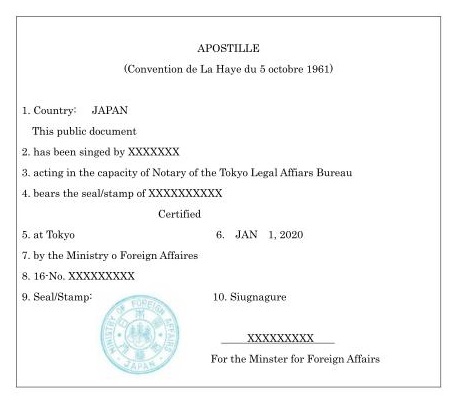What is Notarization
Notarization here means that you go to a notary public office to certify the translated document (e.g., I have translated this document correctly and accurately, etc.), and that you have declared and signed it in front of a notary public. Since Japan has a well-developed seal registration system, you can use your registered seal as a substitute for notarization, so it is not often required.
In other countries, however, the situation is different, and notarization by a notary public (technically called “authentication of a private deed”) is often required.
According to website of Japan National Notaries Association (NIPPON KOSHONIN RENGOKAI),
Authentication (Note: This is a so-called notarization)” is a certification by a notary public of a private deed (a private document with the signature or name and seal of the maker) that the document was prepared based on the intention of the person who prepared the document.
For “Teikan (articles of incorporation)” of stock companies, law firms, etc., certification by a notary public is a legal requirement.
Documents to be executed in a foreign country usually need to be authenticated by a notary public.
If notarization is required, please check the English expressions such as Notarilzation, Notarizled.
Our translator can also visit a notary office to obtain a notarization.
Notarization and Apostille Fees
| Actual cost of notarization and apostille fees (per document. If multiple documents are notarized at the same time, they will be treated as one document. *Notarization and Apostille fees remain the same. | 11,500 Yen |
| Business trip fee for translator | 15,000 yen |
| TOTAL: | 26,500 yen + Translation Fee |
In addition to the actual cost of the translation, a travel fee will be charged for the translator to go to the notary office. Our translations usually include a separate translation certificate, our logo, and the translator’s signature, but we can deliver the translation without these items and have it notarized by the customer.
Periods of time, etc.
It takes about 3 business days or more (depending on the schedule of the notary office) plus the turnaround time for translation. Also, please note that the original copy of the registrations must be sent to us in advance, so the number of days required for that will also be added.

Other
Legalization and Apostille
Legalization
Legalization means that after obtaining a notarization,
- the head of the legal affairs bureau (regional legal affairs bureau) to which the notary belongs certifies that the certification attached to the private document is that of the notary,
- next, have the Ministry of Foreign Affairs certify that the official seal of the head of the Legal Affairs Bureau is correct (this can be done by mail),
- finally, obtain certification from the embassy (or consulate) of the country to which the document is to be submitted (this is called “consular certification”).
This is called “consular certification. (Excerpted from the website of the Japan National Notaries Association) I don’t think they require this much. For more information, please refer to the website of the Japan National Notaries Association.
Appostille

An apostille is a simplified version of the above legalization, and is a certificate that can be used between Hague Convention member countries. For more information, please check the website of the Ministry of Foreign Affairs of Japan. The procedure for obtaining it is as follows;
- Obtaining notarization
- Obtain a certification from the head of the Legal Affairs Bureau (District Legal Affairs Bureau) to which the notary belongs that the certification attached to the private document is that of the notary.
- Obtained an apostille from the Ministry of Foreign Affairs
In Aichi Prefecture, where we are located, it is possible to obtain an apostille at a notary public’s office by following steps 1-3 above under a system called “one-stop service. For more information on the One-Stop Service, please refer to the website of the Ministry of Foreign Affairs of Japan. For information on the fees for obtaining an apostille, please see the section on notarization.